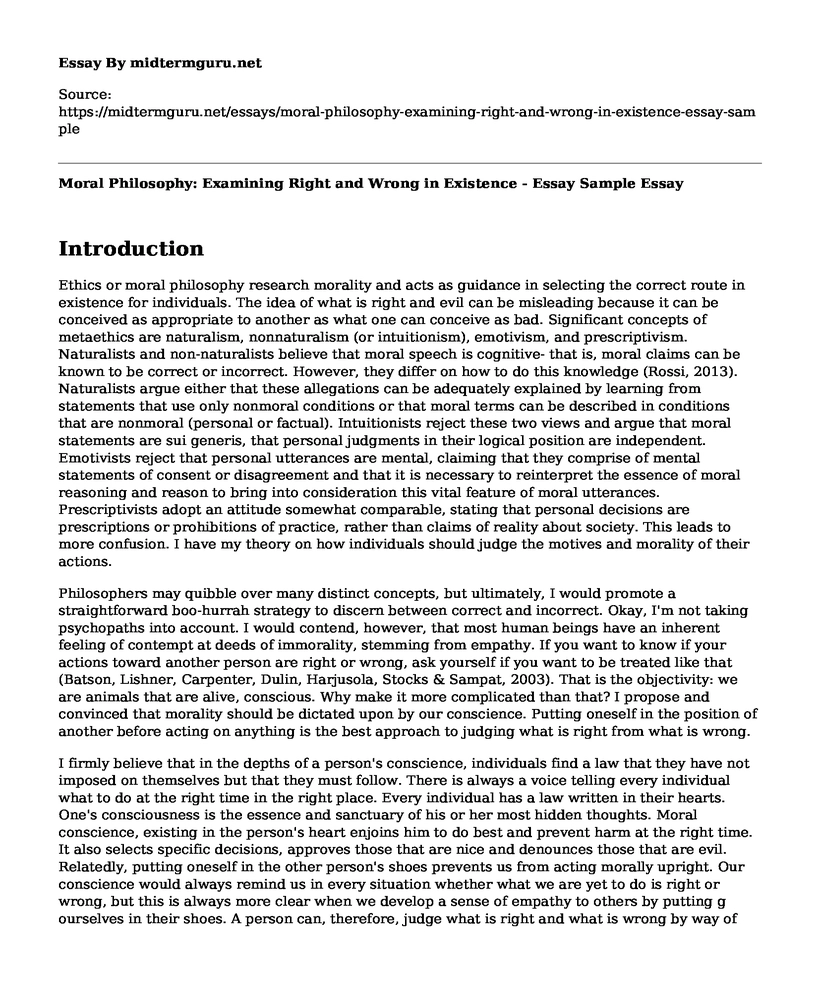Introduction
Ethics or moral philosophy research morality and acts as guidance in selecting the correct route in existence for individuals. The idea of what is right and evil can be misleading because it can be conceived as appropriate to another as what one can conceive as bad. Significant concepts of metaethics are naturalism, nonnaturalism (or intuitionism), emotivism, and prescriptivism. Naturalists and non-naturalists believe that moral speech is cognitive- that is, moral claims can be known to be correct or incorrect. However, they differ on how to do this knowledge (Rossi, 2013). Naturalists argue either that these allegations can be adequately explained by learning from statements that use only nonmoral conditions or that moral terms can be described in conditions that are nonmoral (personal or factual). Intuitionists reject these two views and argue that moral statements are sui generis, that personal judgments in their logical position are independent. Emotivists reject that personal utterances are mental, claiming that they comprise of mental statements of consent or disagreement and that it is necessary to reinterpret the essence of moral reasoning and reason to bring into consideration this vital feature of moral utterances. Prescriptivists adopt an attitude somewhat comparable, stating that personal decisions are prescriptions or prohibitions of practice, rather than claims of reality about society. This leads to more confusion. I have my theory on how individuals should judge the motives and morality of their actions.
Philosophers may quibble over many distinct concepts, but ultimately, I would promote a straightforward boo-hurrah strategy to discern between correct and incorrect. Okay, I'm not taking psychopaths into account. I would contend, however, that most human beings have an inherent feeling of contempt at deeds of immorality, stemming from empathy. If you want to know if your actions toward another person are right or wrong, ask yourself if you want to be treated like that (Batson, Lishner, Carpenter, Dulin, Harjusola, Stocks & Sampat, 2003). That is the objectivity: we are animals that are alive, conscious. Why make it more complicated than that? I propose and convinced that morality should be dictated upon by our conscience. Putting oneself in the position of another before acting on anything is the best approach to judging what is right from what is wrong.
I firmly believe that in the depths of a person's conscience, individuals find a law that they have not imposed on themselves but that they must follow. There is always a voice telling every individual what to do at the right time in the right place. Every individual has a law written in their hearts. One's consciousness is the essence and sanctuary of his or her most hidden thoughts. Moral conscience, existing in the person's heart enjoins him to do best and prevent harm at the right time. It also selects specific decisions, approves those that are nice and denounces those that are evil. Relatedly, putting oneself in the other person's shoes prevents us from acting morally upright. Our conscience would always remind us in every situation whether what we are yet to do is right or wrong, but this is always more clear when we develop a sense of empathy to others by putting g ourselves in their shoes. A person can, therefore, judge what is right and what is wrong by way of their conscience and putting themselves in the other person's shoes (Kochanska & Aksan, 2006). I find this moral theory of my own, supported by facts as the best way to judge what is ethically right and what is morally wrong.
Conclusion
Conclusively, individuals should behave in consciousness and liberty in their actions and choices they make. Doing so makes them consider the impact of their actions on the people who surround them. This makes it easier to act morally upright without straining. I find this ethical theory more significant compared to other theories proposed before.
References
Batson, C. D., Lishner, D. A., Carpenter, A., Dulin, L., Harjusola-Webb, S., Stocks, E. L., ... & Sampat, B. (2003). "... As you would have them do unto you": Does imagining yourself in the other's place stimulate moral action?. Personality and Social Psychology Bulletin, 29(9), 1190-1201. https://journals.sagepub.com/doi/abs/10.1177/0146167203254600
Kochanska, G., & Aksan, N. (2006). Children's conscience and selfregulation. Journal of Personality, 74(6), 1587-1618. https://onlinelibrary.wiley.com/doi/abs/10.1111/j.1467-6494.2006.00421.x
Rossi, M. (2013). Ethical Naturalism. Current Debates. https://www.jstor.org/stable/42970982?seq=1#page_scan_tab_contents
Cite this page
Moral Philosophy: Examining Right and Wrong in Existence - Essay Sample. (2023, Feb 02). Retrieved from https://midtermguru.com/essays/moral-philosophy-examining-right-and-wrong-in-existence-essay-sample
If you are the original author of this essay and no longer wish to have it published on the midtermguru.com website, please click below to request its removal:
- How Two Different Theorists Marx and Weber Would Explain the Same Article
- Paper Example on Plato's Ethical Assessment
- Development and Personality: Annotated Bibliography
- Criticism for Rule and Act Utilitarianism
- My Journey to Become a Psychiatric Nurse Practitioner - Essay Sample
- Ethics in Communication: Ensuring Authentic Communication for Businesses - Essay Sample
- Nutrient Deficiencies & Eating Disorders: A Biochemical Imbalance? - Essay Sample







